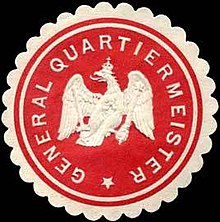
Erich Friedrich Wilhelm Ludendorff was a Prussian-born German military officer and politician. He achieved fame during World War I for his central role in the German victories at Liège and Tannenberg in 1914. After his appointment as First Quartermaster General of the Army General Staff in 1916, he became the chief policymaker in a de facto military dictatorship until Germany's defeat. Later during the Weimar Republic, he took part in the failed 1920 Kapp Putsch and Hitler's 1923 Beer Hall Putsch, thereby contributing significantly to the Nazis' rise to power.

During the American Civil War, the United States Army, the land force that fought to preserve the collective Union of the states, was often referred to as the Union army, the federal army, or the northern army. It proved essential to the restoration and preservation of the United States as a working, viable republic.

The German General Staff, originally the Prussian General Staff and officially the Great General Staff, was a full-time body at the head of the Prussian Army and later, the German Army, responsible for the continuous study of all aspects of war, and for drawing up and reviewing plans for mobilization or campaign. It existed unofficially from 1806, and was formally established by law in 1814, the first general staff in existence. It was distinguished by the formal selection of its officers by intelligence and proven merit rather than patronage or wealth, and by the exhaustive and rigorously structured training which its staff officers undertook.
The title chief of staff identifies the leader of a complex organization such as the armed forces, institution, or body of persons and it also may identify a principal staff officer (PSO), who is the coordinator of the supporting staff or a primary aide-de-camp to an important individual, such as a president, or a senior military officer, or leader of a large organization.

Karl Eduard Wilhelm Groener was a German general and politician. His organisational and logistical abilities resulted in a successful military career before and during World War I.

Quartermaster is a military term, the meaning of which depends on the country and service. In land armies, a quartermaster is an officer who supervises logistics and requisitions, manages stores or barracks, and distributes supplies and provisions. In many navies, a quartermaster is a seaman or petty officer with responsibility for navigation and operation of the helm of a ship.

A military staff or general staff is a group of officers, enlisted, and civilian staff who serve the commander of a division or other large military unit in their command and control role through planning, analysis, and information gathering, as well as by relaying, coordinating, and supervising the execution of their plans and orders, especially in case of multiple simultaneous and rapidly changing complex operations. They are organised into functional groups such as administration, logistics, operations, intelligence, training, etc. They provide multi-directional flow of information between a commanding officer, subordinate military units and other stakeholders. A centralised general staff results in tighter top-down control but requires larger staff at headquarters (HQ) and reduces accuracy of orientation of field operations, whereas a decentralised general staff results in enhanced situational focus, personal initiative, speed of localised action, OODA loop, and improved accuracy of orientation.

The Oberste Heeresleitung was the highest echelon of command of the army (Heer) of the German Empire. In the latter part of World War I, the Third OHL assumed dictatorial powers and became the de facto political authority in the Empire.

Colonel Max Hermann Bauer was a German General Staff officer and artillery expert in the First World War. As a protege of Erich Ludendorff he was placed in charge of the German Army's munition supply by the latter in 1916. In this role he played a leading role in the Hindenburg Programme and the High Command's political machinations. Later Bauer was a military and industrial adviser to President Chiang Kai-Shek of the Republic of China (Taiwan).

The Saudi Arabian Army, officially the Royal Saudi Land Forces, is the principal land warfare branch of the Armed Forces of Saudi Arabia. It is part of the Saudi Ministry of Defense, which is one of the two military departments of the government of Saudi Arabia, together with the Ministry of National Guard. Its primary mandate is the defense of Saudi Arabia’s territory and the safeguarding of national interests against external threats.

The Chief of the Army Staff (COAS) is a position in the Pakistani Army held by a four-star general. As the highest-ranking officer, it is the most powerful position in the army.

The Quartermaster-General to the Forces (QMG) is a senior general in the British Army. The post has become symbolic: the Ministry of Defence organisation charts since 2011 have not used the term "Quartermaster-General to the Forces"; they simply refer to "Chief of Materiel (Land)".

The Army Service Forces was one of the three autonomous components of the United States Army during World War II, the others being the Army Air Forces and Army Ground Forces, created on 9 March 1942. By dividing the Army into three large commands, the Chief of Staff, General George C. Marshall, drastically reduced the number of officers and agencies reporting directly to him. The Army Service Forces brought together elements of five different components of the Army: elements of the War Department General Staff (WDGS), especially its G-4 division ; the Office of the Under Secretary of War; the eight administrative bureaus; the nine corps areas, which became service commands; and the six supply arms and services, which became known as the technical services. The Army Service Forces was initially known as the United States Army Services of Supply but the name was changed on 12 March 1943, as it was felt that the term "supply" did not accurately describe the broad range of its activities. The Army Service Forces was abolished on 11 June 1946 and most of its functions were taken over by the War Department General Staff.

Brigadier General Jesse R. Cross, USA was the 50th Quartermaster General of the United States Army and the Commanding General of the U.S. Army Quartermaster School at Fort Lee, Virginia.

Ann Elizabeth Dunwoody is a retired general of the United States Army. She was the first woman in United States military and uniformed service history to achieve a four-star officer rank, receiving her fourth star on 14 November 2008.

The Western Air Command (WAC) is the regional command of Indian Air Force headquartered in New Delhi. It is the largest and most important Air Command of the IAF, comprising sixteen Air Force Bases (AFBs), and is responsible for aerial defence of North India.

The United States Army Sustainment University is the Army's center of sustainment training for Department of Defense military and civilian personnel pursuing Professional Military Education (PME) and other associated training in military logistics and sustainment. The Army Sustainment University (ASU) has two campuses. The Somervell Campus at Fort Gregg-Adams, Virginia, delivers sustainment leader education for Quartermaster, Ordnance, and Transportation Soldiers and civilians. The Adams Campus at Fort Jackson, South Carolina, includes the Soldier Support Institute, which delivers Adjutant General and Financial Management leader education. ASU is a subordinate command to the United States Army Combined Arms Support Command, and is located at Fort Gregg-Adams, Virginia. The current President of Army Sustainment University is Ms. Sydney A. Smith, Senior Executive Service.

Gustave F. Perna is a retired United States Army four-star general who last served as the chief operating officer of the federal COVID-19 response for vaccine and therapeutics. He previously served as the chief operating officer of Operation Warp Speed from July 2020 until the operation's duties and responsibilities were transferred to the White House COVID-19 Response Team in February 2021. As chief operating officer of COVID-19 response, he oversaw the logistics in the United States federal government's distribution of the vaccine to the COVID-19 pandemic. The Senate confirmed his nomination as chief operating officer on 2 July 2020, and he assumed the office shortly after.

Aundre F. Piggee is a retired senior United States Army officer in the logistics branch. He assumed duties as the Deputy Chief of Staff of the Army for Logistics, G-4 on September 23, 2016. He oversaw policies and procedures used by all Army Logisticians and manages an $11 billion annual portfolio used to fund the Army's arsenals and depots, maintain equipment, and acquire supplies to ensure the Army is ready to fight any mission around the world.
The Indonesian Army Logistics and Transportation Center is a sustainment – formerly combat service support (CSS) – agency of the Indonesian Army. Its primary missions are supporting the development, production, acquisition, and sustainment of general supply, mortuary affairs, subsistence, petroleum and water, material and distribution management during peace and war and in support of civil disaster relief. It is also tasked with providing combat logistics and equipment, personnel and materiel transport services over any terrain on land, rail, air and sea in coordination with the other service branches of the Indonesian National Armed Forces.


















